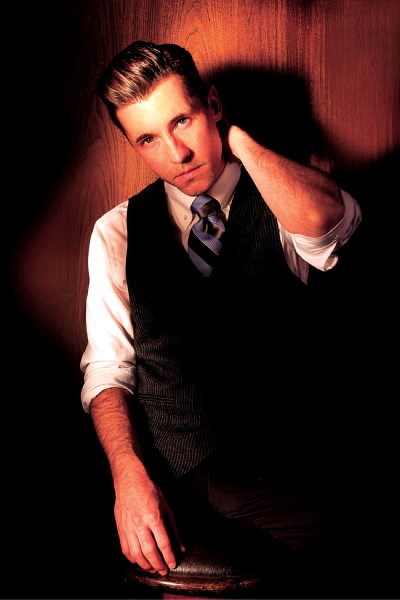A couple of weeks ago, Royal Wood was right in the middle of the multimedia extravaganza that is the Juno Awards.
There he was – a small town guy in Hogtown, the Big Smoke, nominated in one category, presenting in another, rubbing elbows with peers and paparazzi, all bright lights and big city.
You’d think all that glitz might make it tough to head out on the road to play a succession of gigs in smaller towns and smaller venues across Canada.
Not so, says Wood, who was nominated for a Juno as Songwriter of the Year and who presented Sarah McLachlan’s stage performance of “Loving You Is Easy” with Keshia Chante.
Wood plays Canmore’s Communitea Café, Wednesday, April 13.
Wood’s Juno nomination was for his most recent release, The Waiting, which sparked a Canada-wide, full-band effort. The Waiting followed the full-lengths A Good Enough Day (2007), Tall Tales (2006) and a pair of EPs; The Lost and Found (2009) and The Milkweed (2002).
His current tour, which will carry him through Alberta and B.C. before heading eastward again, “is all smaller venues. It’ll be more intimate, which allows you to make a real connection with audiences,” said Wood from his car en route to Stratford, Ont. last week (he wasn’t at the wheel).
“That last tour was with a full band and grand pianos; it was pretty much a dream tour and pretty much sold out. After that tour, I kind of scratched my head and wondered what to do. I figured I couldn’t go back to the big cities again, so I decided on a more off the beaten path tour.
“But I’m a small town guy and I really enjoy the more intimate shows. It’ll be just me with piano and guitar.”
That small town is Lakefield, ON, where Wood lived as a youngster before moving through a succession of larger cities – Peterborough, Montreal and Toronto, where he is now based.
He began tickling the ivories at age four, playing by ear, and it was early on that Woods’ parents realized farming might not be in their offspring’s future.
“My parents were intelligent enough to recognize some talent and they got me some lessons,” he said. “They were very understanding and supportive of what I’ve done.”
As a youngster, Wood played in his high school band and until 2007 held down day jobs in book and record stores and office jobs. Since then, he’s been all about his music.
In 2008 he attended the Junos, “but that was more behind the scenes,” he said. “This time it was living the dream. It was more of a ride to be on. I was there with peers and colleagues and it was very enjoyable; Sarah McLachlan is a good friend, so to introduce her was special.”
With his album The Waiting, Wood reached into his personal life for inspiration. Now in his 30s, he’s settled down, gotten married and suffered through the loss of a couple of grandparents.
The Waiting tracks feature Wood’s strong vocals, of course, and feature a rock-ish piano-driven track of loves lost in “Do You Recall”, of lust in “On Top Of Your Love” and a light-hearted look at life in “The Island”.
At a gig such as the upcoming event at Communitea, Wood will present a cross-section of his work to date, “and I’m trying out some new stuff to see how it connects with an audience.”
Some of the new stuff, he said, is a result of slowing down a bit and gaining an appreciation for where he is.
“My 20s were a blur. I wasn’t about the moment; I was always looking forward to what might be next in the future. Since then, I’ve had a lot of things to grapple with.
“When you’re a little kid, you play music because it brings you joy, or because you want to emulate someone. It’s cathartic.
“Today, my music is more of a diary page of my life. I used to cover my personal life with metaphor, but now, in my 30s, I’m mature enough to open up and not dress it up.
“And marriage was a big change for me. It’s about sharing with someone you love, not just being about yourself. It’s the most important thing I’ve ever done. It’s something special and sacred to share your life with someone and I’m learning to balance marriage and music.”
Wood said his songwriting is an ebb and flow process. He’s always writing and jotting down ideas in a notebook, but can be hit by an idea anywhere; in a grocery store, for example.
Sometimes melody and lyrics come to him at the same time, sometimes separately. “It just depends on the song. I let it flow, because I think if you work in a set way, you’re closing doors.”
With three full-length albums now under his belt, Wood says he doesn’t see changing the process, even in a singles-driven downloadable world.
“Everybody’s talking about singles, these days,” he said. “But I really like the concept of a record; taking a sequence of songs and putting it all together.
“Singles is what tends to be purchased today, but when I was a kid and in my 20s, I liked to go to the record store, buy a CD, read the liner notes, look at the artwork – have the whole experience.
“I think now, when you download only a single, it ends the connection between the listener and the artist. Still, I hope that, like when I was a kid, people search for more about an artist. When I was a kid, when there was something I liked, I searched out everything about an artist.”




